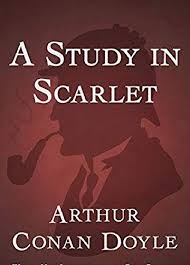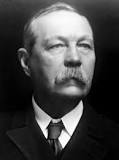A Study in Scarlet Page #6
A Study in Scarlet is an 1887 detective novel by Scottish author Arthur Conan Doyle. The story marks the first appearance of Sherlock Holmes and Dr. Watson, who would become the most famous detective duo in popular fiction.
“For Mr. Sherlock Holmes,” he said, stepping into the room and handing my friend the letter. Here was an opportunity of taking the conceit out of him. He little thought of this when he made that random shot. “May I ask, my lad,” I said, in the blandest voice, “what your trade may be?” “Commissionaire, sir,” he said, gruffly. “Uniform away for repairs.” “And you were?” I asked, with a slightly malicious glance at my companion. “A sergeant, sir, Royal Marine Light Infantry, sir. No answer? Right, sir.” He clicked his heels together, raised his hand in a salute, and was gone. CHAPTER III. THE LAURISTON GARDEN MYSTERY [6] I CONFESS that I was considerably startled by this fresh proof of the practical nature of my companion’s theories. My respect for his powers of analysis increased wondrously. There still remained some lurking suspicion in my mind, however, that the whole thing was a pre-arranged episode, intended to dazzle me, though what earthly object he could have in taking me in was past my comprehension. When I looked at him he had finished reading the note, and his eyes had assumed the vacant, lack-lustre expression which showed mental abstraction. “How in the world did you deduce that?” I asked. “Deduce what?” said he, petulantly. “Why, that he was a retired sergeant of Marines.” “I have no time for trifles,” he answered, brusquely; then with a smile, “Excuse my rudeness. You broke the thread of my thoughts; but perhaps it is as well. So you actually were not able to see that that man was a sergeant of Marines?” “No, indeed.” “It was easier to know it than to explain why I knew it. If you were asked to prove that two and two made four, you might find some difficulty, and yet you are quite sure of the fact. Even across the street I could see a great blue anchor tattooed on the back of the fellow’s hand. That smacked of the sea. He had a military carriage, however, and regulation side whiskers. There we have the marine. He was a man with some amount of self-importance and a certain air of command. You must have observed the way in which he held his head and swung his cane. A steady, respectable, middle-aged man, too, on the face of him--all facts which led me to believe that he had been a sergeant.” “Wonderful!” I ejaculated. “Commonplace,” said Holmes, though I thought from his expression that he was pleased at my evident surprise and admiration. “I said just now that there were no criminals. It appears that I am wrong--look at this!” He threw me over the note which the commissionaire had brought. [7] “Why,” I cried, as I cast my eye over it, “this is terrible!” “It does seem to be a little out of the common,” he remarked, calmly. “Would you mind reading it to me aloud?” This is the letter which I read to him---- “MY DEAR MR. SHERLOCK HOLMES,-- “There has been a bad business during the night at 3, Lauriston Gardens, off the Brixton Road. Our man on the beat saw a light there about two in the morning, and as the house was an empty one, suspected that something was amiss. He found the door open, and in the front room, which is bare of furniture, discovered the body of a gentleman, well dressed, and having cards in his pocket bearing the name of ‘Enoch J. Drebber, Cleveland, Ohio, U.S.A.’ There had been no robbery, nor is there any evidence as to how the man met his death. There are marks of blood in the room, but there is no wound upon his person. We are at a loss as to how he came into the empty house; indeed, the whole affair is a puzzler. If you can come round to the house any time before twelve, you will find me there. I have left everything in statu quo until I hear from you. If you are unable to come I shall give you fuller details, and would esteem it a great kindness if you would favour me with your opinion. Yours faithfully, “TOBIAS GREGSON.” “Gregson is the smartest of the Scotland Yarders,” my friend remarked; “he and Lestrade are the pick of a bad lot. They are both quick and energetic, but conventional--shockingly so. They have their knives into one another, too. They are as jealous as a pair of professional beauties. There will be some fun over this case if they are both put upon the scent.” I was amazed at the calm way in which he rippled on. “Surely there is not a moment to be lost,” I cried, “shall I go and order you a cab?” “I’m not sure about whether I shall go. I am the most incurably lazy devil that ever stood in shoe leather--that is, when the fit is on me, for I can be spry enough at times.” “Why, it is just such a chance as you have been longing for.” “My dear fellow, what does it matter to me. Supposing I unravel the whole matter, you may be sure that Gregson, Lestrade, and Co. will pocket all the credit. That comes of being an unofficial personage.” “But he begs you to help him.” “Yes. He knows that I am his superior, and acknowledges it to me; but he would cut his tongue out before he would own it to any third person. However, we may as well go and have a look. I shall work it out on my own hook. I may have a laugh at them if I have nothing else. Come on!” He hustled on his overcoat, and bustled about in a way that showed that an energetic fit had superseded the apathetic one. “Get your hat,” he said. “You wish me to come?” “Yes, if you have nothing better to do.” A minute later we were both in a hansom, driving furiously for the Brixton Road. It was a foggy, cloudy morning, and a dun-coloured veil hung over the house-tops, looking like the reflection of the mud-coloured streets beneath. My companion was in the best of spirits, and prattled away about Cremona fiddles, and the difference between a Stradivarius and an Amati. As for myself, I was silent, for the dull weather and the melancholy business upon which we were engaged, depressed my spirits. “You don’t seem to give much thought to the matter in hand,” I said at last, interrupting Holmes’ musical disquisition. “No data yet,” he answered. “It is a capital mistake to theorize before you have all the evidence. It biases the judgment.” “You will have your data soon,” I remarked, pointing with my finger; “this is the Brixton Road, and that is the house, if I am not very much mistaken.” “So it is. Stop, driver, stop!” We were still a hundred yards or so from it, but he insisted upon our alighting, and we finished our journey upon foot. Number 3, Lauriston Gardens wore an ill-omened and minatory look. It was one of four which stood back some little way from the street, two being occupied and two empty. The latter looked out with three tiers of vacant melancholy windows, which were blank and dreary, save that here and there a “To Let” card had developed like a cataract upon the bleared panes. A small garden sprinkled over with a scattered eruption of sickly plants separated each of these houses from the street, and was traversed by a narrow pathway, yellowish in colour, and consisting apparently of a mixture of clay and of gravel. The whole place was very sloppy from the rain which had fallen through the night. The garden was bounded by a three-foot brick wall with a fringe of wood rails upon the top, and against this wall was leaning a stalwart police constable, surrounded by a small knot of loafers, who craned their necks and strained their eyes in the vain hope of catching some glimpse of the proceedings within.
Translation
Translate and read this book in other languages:
Select another language:
- - Select -
- 简体中文 (Chinese - Simplified)
- 繁體中文 (Chinese - Traditional)
- Español (Spanish)
- Esperanto (Esperanto)
- 日本語 (Japanese)
- Português (Portuguese)
- Deutsch (German)
- العربية (Arabic)
- Français (French)
- Русский (Russian)
- ಕನ್ನಡ (Kannada)
- 한국어 (Korean)
- עברית (Hebrew)
- Gaeilge (Irish)
- Українська (Ukrainian)
- اردو (Urdu)
- Magyar (Hungarian)
- मानक हिन्दी (Hindi)
- Indonesia (Indonesian)
- Italiano (Italian)
- தமிழ் (Tamil)
- Türkçe (Turkish)
- తెలుగు (Telugu)
- ภาษาไทย (Thai)
- Tiếng Việt (Vietnamese)
- Čeština (Czech)
- Polski (Polish)
- Bahasa Indonesia (Indonesian)
- Românește (Romanian)
- Nederlands (Dutch)
- Ελληνικά (Greek)
- Latinum (Latin)
- Svenska (Swedish)
- Dansk (Danish)
- Suomi (Finnish)
- فارسی (Persian)
- ייִדיש (Yiddish)
- հայերեն (Armenian)
- Norsk (Norwegian)
- English (English)
Citation
Use the citation below to add this book to your bibliography:
Style:MLAChicagoAPA
"A Study in Scarlet Books." Literature.com. STANDS4 LLC, 2025. Web. 5 Feb. 2025. <https://www.literature.com/book/a_study_in_scarlet_287>.








Discuss this A Study in Scarlet book with the community:
Report Comment
We're doing our best to make sure our content is useful, accurate and safe.
If by any chance you spot an inappropriate comment while navigating through our website please use this form to let us know, and we'll take care of it shortly.
Attachment
You need to be logged in to favorite.
Log In